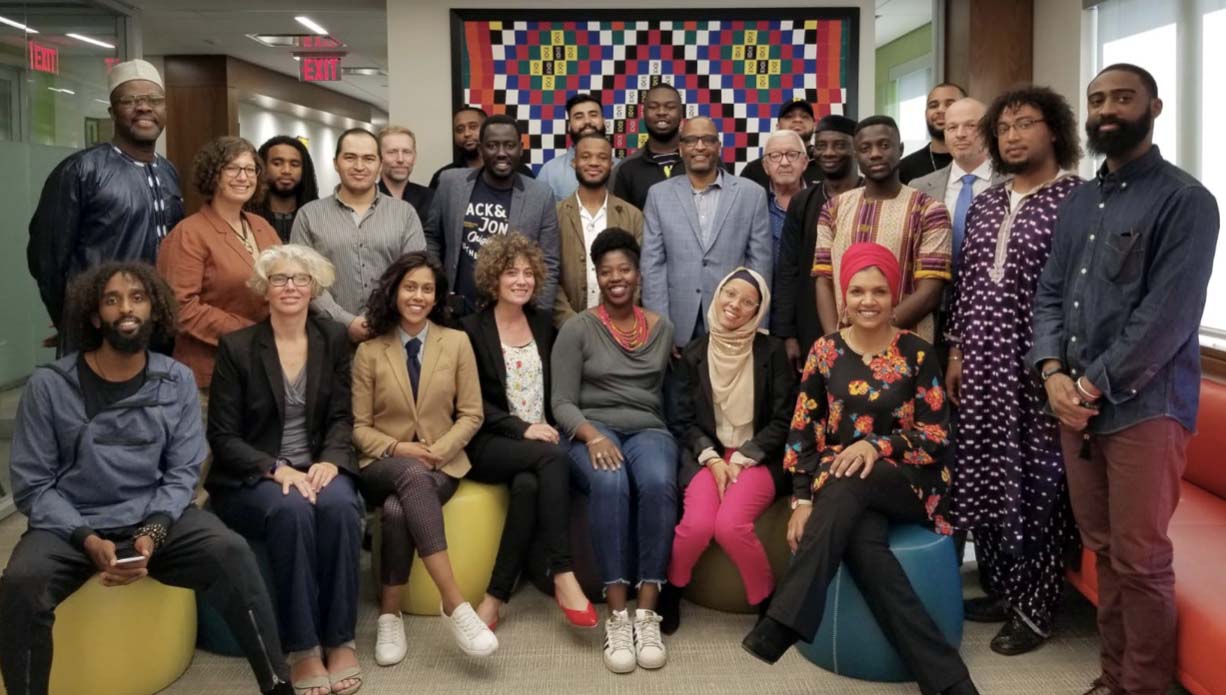Africa, Globalization, and the Muslim Worlds
September 19-21, 2019 at Harvard Divinity School
“Africa, Globalization, and the Muslim Worlds,” the conference convened at Harvard University by ISITA and Harvard Divinity School from September 19 to 21, 2019, featured scholarly panels on topics spanning time periods, continents, and disciplines, as well as a musical performance by the Baraka Boys. The conference expanded on conversations begun at Northwestern at the 2018 ISITA conference “Islam in Global Africa.”
 Panels addressed three primary themes: the long presence of African Muslims in the Americas, transnational Islam, and emerging paradigms in the study of Islam in Africa. ISITA director Zekeria Ahmed Salem set the stage with a keynote lecture on “Global Shinqit” that highlighted the influence of Mauritanian Islamic scholars such as Shaykh Abdallah Bin Bayah, now based in the United Arab Emirates, on the constitution of religious authority in the Muslim world.
Panels addressed three primary themes: the long presence of African Muslims in the Americas, transnational Islam, and emerging paradigms in the study of Islam in Africa. ISITA director Zekeria Ahmed Salem set the stage with a keynote lecture on “Global Shinqit” that highlighted the influence of Mauritanian Islamic scholars such as Shaykh Abdallah Bin Bayah, now based in the United Arab Emirates, on the constitution of religious authority in the Muslim world.
At the panel on African Muslims in the Americas, Ayodeji Ogunnaike (Bowdoin College) argued that up until the early 20th century, West African Muslims in Brazil were able to recreate Islamic communities and intellectual traditions while maintaining ties to their homeland. Diego Giovanni Castellanos (National University of Colombia) focused on how a group of Afro-Colombian converts to Islam in the 1960s used Islamic beliefs and practices to strengthen Afro-descendant ethnic identity amid social exclusion.Exploring the microhistories of Muslims traveling between the Middle Niger and Jamaica from 1790 to 1854, Madina Thiam (University of California, Los Angeles) demonstrated how the travelers leveraged their Islamic backgrounds to negotiate spaces of autonomy and self-determination.
Panels on transnational Islam highlighted the survival strategies of far-flung African Muslim diaspora communities. Panelist Irit Bak (University of Tel Aviv) discussed the African Muslims in Jerusalem who used Sufi affiliation to create community networks and support West African pilgrims to Mecca during the colonial era. Steve Howard (Ohio University) discussed the efforts of Sudan’s Republican Brothers and Sisters—dispersed to the Gulf States and the US following the 1985 execution of the movement’s founder, Mahmoud Taha—to sustain the movement’s discipline and commitment to social justice in the contexts of extremist Gulf politics and the “moral ambiguity” of the US. Cheikh Niang (Université Cheikh Anta Diop) examined the evolving sociopolitical perspectives of the Niassene branch of the Senegalese Tijaniyya Sufi order as it becomes increasingly globalized. Youssef Carter (Harvard University) explored how another Senegalese Sufi order—the Mustafawi—has gained a following among African American converts to Islam for whom West African Sufi ethics function as a philosophy of liberation and healing from trauma.
Other papers examined the tension that arises between Islamic ethics of racial egalitarianism and European-derived racial hierarchies when non-African Muslims intervene in Muslim Africa. Taking the international nongovernmental organization Islamic Relief and its HIV-AIDS prevention efforts in South Africa as a case study, Rhea Rahman (Brooklyn College) argued that while the ideological logic of global white supremacy shaped Islamic Relief’s interventions, South African Muslim activists were able to counter racialized assumptions at the grassroots level. Similarly, Ezgi Guner (University of Illinois at Urbana-Champaign) pointed to the “white savior complex” underlying the pedagogical practices of Turkish schools in Africa, which marginalize Muslim African religious interpretations, practices, and institutions and place Ottoman-Turkish tradition at the center of Islamic civilization.
Two papers on Shi‘i Islam revealed the interplay of local, national, and transnational actors in shaping Shi‘i social welfare provision and constituting Shi‘i communities in Africa. Mara Leichtman (Michigan State University) argued that Iranian influence in East African Shi‘ism has been overstated; instead, East African Shi‘a have their own local Islamic histories, a variety of transnational ties, independent reasons for adhering to their faith, and freedom to choose which marja‘ (supreme religious authority) to follow. Gadija Ahjum (University of Cape Town) contended that as Cape Town’s Shi‘i community has grown over the past three decades, a distinctly localized South African Shi‘ism has emerged. Amidu Sanni (Fountain University, Nigeria) suggested that further exploration of sources in Ajami (African languages written in Arabic script) will yield insights into the creative tension between the local and the global in the production of Islamic knowledge in Africa.
The final panel addressed new paradigms in the study of Islam in Africa. Zachary Wright (Northwestern University in Qatar) considered two texts central to the Tijaniyya Sufi order in North and West Africa since the 18th century and argued that African Muslim societies’ complex understandings of metaphysics deserve more study. Oludamini Ogunnaike (University of Virginia) highlighted the intertextual creativity of West African madīḥ poetry in praise of the Prophet, a body of work reflecting adaptations and changes made by successive generations of readers. Samiha Rahman (University of Pennsylvania) considered how young African American Muslims in Senegal’s Medina Baye, the spiritual capital of the Niassene Tijaniyya, experience the gift-giving economy at the heart of the Islamic education they receive there. Felicitas Becker (Ghent University) concluded the panel with a reflection on Swahili-language sermons by Muslim preachers in East Africa who position their reformist projects in relation to the notion of maendeleo (progress/ development).
“Africa, Globalization, and the Muslim Worlds” was cosponsored by ISITA and Harvard University’s Alwaleed Professorship of Contemporary Islamic Religion and Society. The conference steering committee was led by ISITA director Zekeria Ahmed Salem and Harvard Divinity School professor Ousmane Kane.
Report by Rebecca Shereikis. Originally published in "Program of African Studies News and Events," Winter 2020, vol. 30, no. 2.